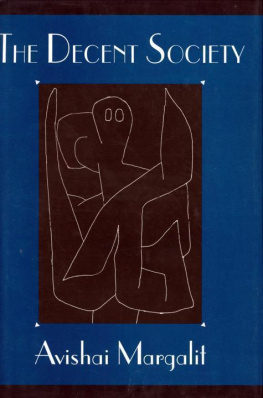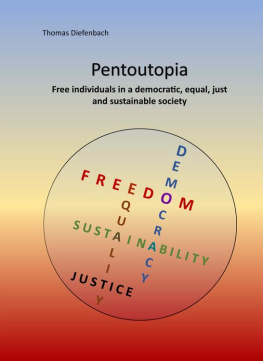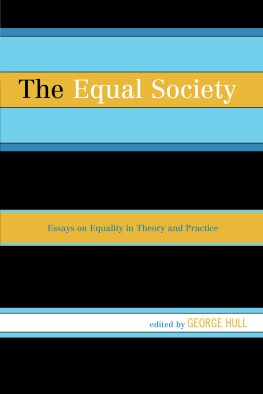Avishai Margalit
"Translated by Naomt Goldblum


ix
Part I. The Concept of Humiliation
Part II. The Grounds of Respect
Part III. Decency as a Social Concept
Part IV. Putting Social Institutions to the Test
Some twenty years ago I accompanied Sidney Morgenbesser to the airport. In the lounge, while waiting for his flight, we discussed Rawls's theory of justice, which had deeply impressed its both. Before parting, Morgenbesser announced to me-as well as to all the other passengersthat the urgent problem was not the just society but the decent society. To this day I am not sure what he meant by this, but the expression made it great impression on me. This book owes its existence to that remark of Morgenbesser's. I myself owe Morgenbesser much of my philosophical apprenticeship and not a few of my social persuasions.
The idea of the decent society appealed to me, but for many years I was not able to flesh it out. Gradually conversations I had with Palestinians (luring their uprising (the Intifada) in the occupied territories, as well as conversations I had with new immigrants to Israel from the countries of the defunct Communist bloc, convinced me of the centrality of honor and humiliation in the lives of people-and, consequently, of the importance that ought to be allotted to the concepts of honor and humiliation in political thought. Thus the idea was born of the decent society as a society which does not humiliate.
This book is not, however, about the Intifada or the downfall of Communism: these serve as illustrations only. Yet the book was written with the Israeli reader in mind, and it was written in Hebrew. It was David Hartman, among others, who convinced me that there might be a wider audience for the notion of the decent society than the Hebrew reading public. With his active encouragement and through the Shalom Hartman Institute in Jerusalem which he directs, a translation was sponsored. Naomi Goldblum bore the brunt of the task and carried it through with dedication.
Friends who read various drafts of the book helped me a great deal: Maya Bar-Hillel, Moshe Halbertal, David Heyd, Joseph Raz, and Michael Walzer. I want to thank them all. My wife, Edna Ullman-Margalit, my life partner and my work partner, helped me in the larger contours as well as in the smaller details. To thank her is not enough.
Institutions also helped. My stay as a Visiting Fellow at St. Antony's College, Oxford, provided me with a decent society for writing large chunks of this book. The pleasant library of the Van Leer Institute in Jerusalem, where I have been spending most of my waking hours for many years, made it possible for me to write more. Other support was provided by the Center for Rationality and Interactive Decisions of the Hebrew University of Jerusalem. The finishing touches were given to the hook in the warm and wonderful home of my friends Irene and Alfred Brendel in Hampstead. All of them have my gratitude.
This is not a textbook. The length of the various chap ters and sections reflects not their relative weight but, rather, what I felt I had to say about their topics. I believe every sentence of this book to be true. I also believe that there are sentences in this book which are erroneous. This state of affairs is referred to by philosophers as the Preface Paradox. Whatever the logical status of this paradox, it is clear to me that it well reflects my own state of affairs.
I have written this book out of conviction. Conviction does not make one immune to error; if' anything, it enhances its likelihood. I do not doubt that this book contains errors. I only hope that it contains enough truth.
Jerusalem
August 1995
Last night the Sheik went all about the city,
lamp in hand, crying, "I am weary of beast and
devil, a human being is my desire."

What is a decent society? The answer I am suggesting is roughly the following: A decent society is one whose institutions do not humiliate people. I distinguish between a decent society and a civilized one. A civilized society is one whose members do not humiliate one another, while a decent society is one in which the institutions do not humiliate people. Thus, for example, one might think of Communist Czechoslovakia as a nondecent but civilized society, while it is possible to imagine without any contradiction a Czech Republic which would be more decent but less civilized.
Social institutions can be described in two ways: abstractly, by their rules or laws, or concretely, by their actual behavior. Analogously, one can speak of institutional humiliation by law, as manifested by the Nuremberg Laws or those of apartheid, in contrast to concrete acts of institutional humiliation, such as the Los Angeles police officers' treatment of the black motorist Rodney King. In the concrete description of institutions the distinction between a noncivilized and a nondecent society is blurred. My interest in institutions is focused on their concrete aspect, and so this distinction may become blurred quite often in this book. But even if it is not always clear how the distinction applies in particular cases, it is nevertheless a distinction with merit. The idea of a civilized society is a microethical concept concerned with the relationships between individuals, while the idea of a decent society is a macroethical concept concerned with the setup of the society as a whole.
The concept of a decent society may be compared and contrasted with other evaluative terms-for example, that of a proper society as one that adheres to due process, or that of a respectable society as one that protects its citizens' respectability. But the most important comparison is between a decent and a just society. Clarifying the concept of a decent society requires not only elucidating the contrast between decent and nondecent societies but also comparing it with other social notions, whether rival or complementary. I do not explicitly compare the notion of a decent society with alternative social notions aside from that of a just society, but I mention the possibility of comparison in the hope of illuminating it throughout the book.
In Part I, I discuss the reasons for feeling humiliated. I begin with two radical claims. One is that of anarchism: the very existence of governing institutions is a reason for feeling humiliated. The other is that of Stoicism: no governing institutions can provide reasons for feeling humiliated. Both of these extreme claims are rejected in favor of the assertion that governing institutions do not necessarily humiliate people, but they are able to do so.
The concept of a decent society, I maintain, is not necessarily connected with the concept of rights. Even a society without a concept of rights can develop concepts of honor and humiliation appropriate for a decent society. The appropriate concept of honor is the idea of self-respect, as opposed to self-esteem or social honor.








